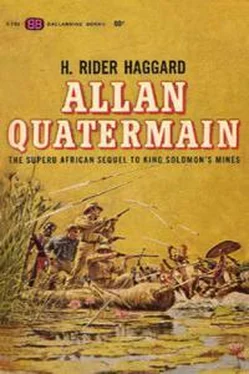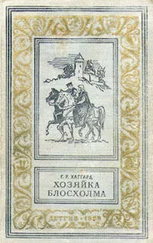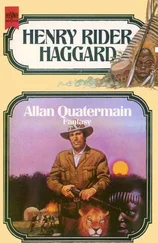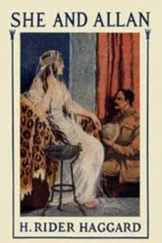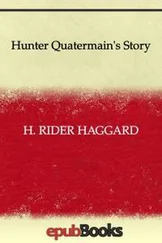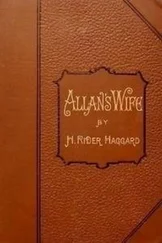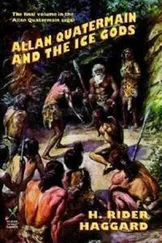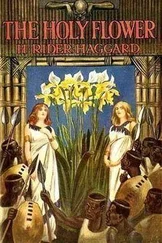'Near go that,' he shouted; 'but all's well that ends well.'
I assented, but I could not help feeling that it had not ended well for me. I was sorely hurt.
Just then we saw the smaller bodies of cavalry stationed on our extreme right and left, and which were now reinforced by the three thousand sabres which we had held in reserve, flash out like arrows from their posts and fall upon the disordered flanks of Sorais' forces, and that charge decided the issue of the battle. In another minute or two the enemy was in slow and sullen retreat across the little stream, where they once more re–formed. Then came another lull, during which I managed to get a second horse, and received my orders to advance from Sir Henry, and then with one fierce deep–throated roar, with a waving of banners and a wide flashing of steel, the remains of our army took the offensive and began to sweep down, slowly indeed, but irresistibly from the positions they had so gallantly held all day.
At last it was our turn to attack.
On we moved, over the piled–up masses of dead and dying, and were approaching the stream, when suddenly I perceived an extraordinary sight. Galloping wildly towards us, his arms tightly clasped around his horse's neck, against which his blanched cheek was tightly pressed, was a man arrayed in the full costume of a Zu–Vendi general, but in whom, as he came nearer, I recognized none other than our lost Alphonse. It was impossible even then to mistake those curling mustachios. In a minute he was tearing through our ranks and narrowly escaped being cut down, till at last somebody caught his horse's bridle, and he was brought to me just as a momentary halt occurred in our advance to allow what remained of our shattered squares to form into line.
'Ah, monsieur,' he gasped out in a voice that was nearly inarticulate with fright, 'grace to the sky, it is you! Ah, what I have endured! But you win, monsieur, you win; they fly, the laches. But listen, monsieur—I forget, it is no good; the Queen is to be murdered tomorrow at the first light in the palace of Milosis; her guards will leave their posts, and the priests are going to kill her. Ah yes! they little thought it, but I was ensconced beneath a banner, and I heard it all.'
'What?' I said, horror–struck; 'what do you mean?'
'What I say, monsieur; that devil of a Nasta he went last night to settle the affair with the Archbishop [Agon]. The guard will leave open the little gate leading from the great stair and go away, and Nasta and Agon's priests will come in and kill her. Themselves they would not kill her.'
'Come with me,' I said, and, shouting to the staff–officer next to me to take over the command, I snatched his bridle and galloped as hard as I could for the spot, between a quarter and half a mile off, where I saw the royal pennon flying, and where I knew that I should find Curtis if he were still alive. On we tore, our horses clearing heaps of dead and dying men, and splashing through pools of blood, on past the long broken lines of spearmen to where, mounted on the white stallion Nyleptha had sent to him as a parting gift, I saw Sir Henry's form towering above the generals who surrounded him.
Just as we reached him the advance began again. A bloody cloth was bound around his head, but I saw that his eye was as bright and keen as ever. Beside him was old Umslopogaas, his axe red with blood, but looking quite fresh and uninjured.
'What's wrong, Quatermain?' he shouted.
'Everything. There is a plot to murder the Queen tomorrow at dawn. Alphonse here, who has just escaped from Sorais, has overheard it all,' and I rapidly repeated to him what the Frenchman had told me.
Curtis' face turned deadly pale and his jaw dropped.
'At dawn,' he gasped, 'and it is now sunset; it dawns before four and we are nearly a hundred miles off—nine hours at the outside. What is to be done?'
An idea entered into my head. 'Is that horse of yours fresh?' I said.
'Yes, I have only just got on to him—when my last was killed, and he has been fed.'
'So is mine. Get off him, and let Umslopogaas mount; he can ride well. We will be at Milosis before dawn, or if we are not—well, we cannot help it. No, no; it is impossible for you to leave now. You would be seen, and it would turn the fate of the battle. It is not half won yet. The soldiers would think you were making a bolt of it. Quick now.'
In a moment he was down, and at my bidding Umslopogaas sprang into the empty saddle.
'Now farewell,' I said. 'Send a thousand horsemen with remounts after us in an hour if possible. Stay, despatch a general to the left wing to take over the command and explain my absence.'
'You will do your best to save her, Quatermain?' he said in a broken voice.
'Ay, that I will. Go on; you are being left behind.'
He cast one glance at us, and accompanied by his staff galloped off to join the advance, which by this time was fording the little brook that now ran red with the blood of the fallen.
As for Umslopogaas and myself, we left that dreadful field as arrows leave a bow, and in a few minutes had passed right out of the sight of slaughter, the smell of blood, and the turmoil and shouting, which only came to our ears as a faint, far–off roaring like the sound of distant breakers.
At the top of the rise we halted for a second to breathe our horses; and, turning, glanced at the battle beneath us, which, illumined as it was by the fierce rays of the sinking sun staining the whole scene red, looked from where we were more like some wild titanic picture than an actual hand–to–hand combat. The distinguishing scenic effect from that distance was the countless distinct flashes of light reflected from the swords and spears, otherwise the panorama was not so grand as might have been expected. The great green lap of sward in which the struggle was being fought out, the bold round outline of the hills behind, and the wide sweep of the plain beyond, seemed to dwarf it; and what was tremendous enough when one was in it, grew insignificant when viewed from the distance. But is it not thus with all the affairs and doings of our race about which we blow the loud trumpet and make such a fuss and worry? How utterly antlike, and morally and physically insignificant, must they seem to the calm eyes that watch them from the arching depths above!
'We win the day, Macumazahn,' said old Umslopogaas, taking in the whole situation with a glance of his practised eye. 'Look, the Lady of the Night's forces give on every side, there is no stiffness left in them, they bend like hot iron, they are fighting with but half a heart. But alas! the battle will in a manner be drawn, for the darkness gathers, and the regiments will not be able to follow and slay!'—and he shook his head sadly. 'But,' he added, 'I do not think that they will fight again. We have fed them with too strong a meat. Ah! it is well to have lived! At last I have seen a fight worth seeing.'
By this time we were on our way again, and as we went side by side I told him what our mission was, and how that, if it failed, all the lives that had been lost that day would have been lost in vain.
'Ah!' he said, 'nigh on a hundred miles and no horses but these, and to be there before the dawn! Well—away! away! man can but try, Macumazahn; and mayhap we shall be there in time to split that old "witch–finder's" [Agon's] skull for him. Once he wanted to burn us, the old "rain–maker", did he? And now he would set a snare for my mother [Nyleptha], would he? Good! So sure as my name is the name of the Woodpecker, so surely, be my mother alive or dead, will I split him to the beard. Ay, by T'Chaka's head I swear it!' and he shook Inkosi–kaas as he galloped. By now the darkness was closing in, but fortunately there would be a moon later, and the road was good.
Читать дальше
